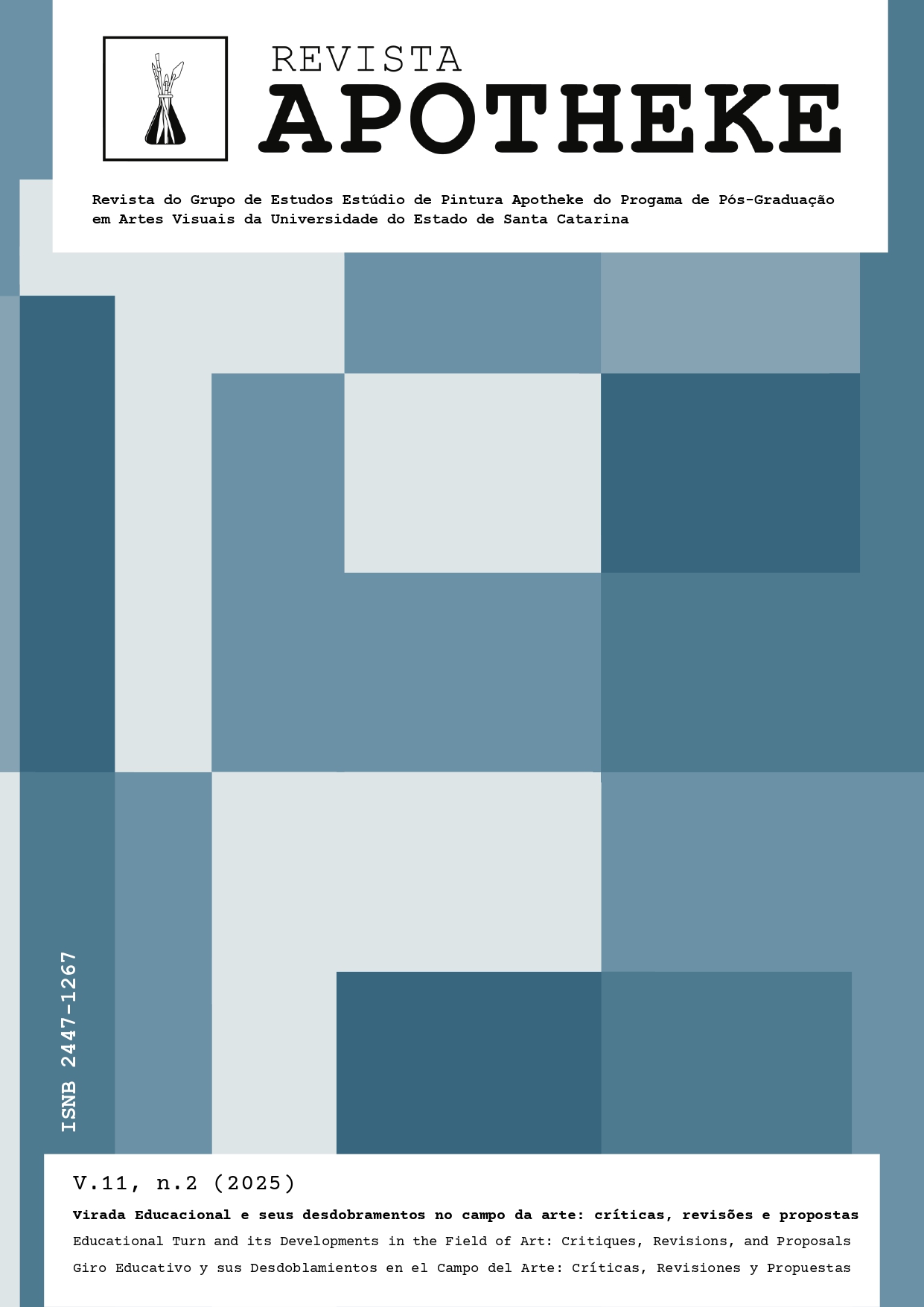A experiência estética com o uso didático do cinema nas aulas de Filosofia: uma perspectiva a partir de John Dewey
DOI:
https://doi.org/10.5965/244712671122025126Palavras-chave:
cinema, Dewey, educação, ensino de filosofia, experiência estéticaResumo
O presente artigo explora a experiência estética fornecida pelo uso do cinema como recurso didático nas aulas de Filosofia, a partir das ideias de John Dewey sobre arte e educação. Com base nas suas principais obras, como Arte como Experiência e Democracia e Educação, observamos que Dewey nos chama a atenção em perceber que o real sentido a que uma atitude estética pode proporcionar diz respeito a que seja uma atitude desinteressada, uma abertura, uma disponibilidade não tanto para a coisa ou o acontecimento “em si”, naquilo que ele tem de consistência, mas para os efeitos que ele pode produzir, de tal modo que a ideia de arte tenha se ampliado e ultrapassado os limites da inteligibilidade. Desta forma, a contribuição do pensamento deweyano se dirige na perspectiva de um enriquecimento de tais experiências sob um prisma formativo. O desafio posto está em desenvolver de forma fecunda, no cerne do ensino médio, as provocações que podem vir a surgir de diferentes expressões artísticas. A obra de arte sempre serviu como objeto de reflexão filosófico, de tal modo que possa ser compreendida como um importante instrumento para indagar e promover questões filosóficas. Isto se ratifica quando, observamos elementos, de modo particular, em produções cinematográficas, aspectos como consumismo, competição desenfreada, dificuldade em conviver com a pluralidade e as diferenças, separação entre arte e vida, fragmentação e mercantilização das relações humanas, entre outros, como reflexos dos dualismos que afetam, de forma marcante, a vida humana. Por esta razão, a obra Arte como Experiência tem um alcance extremamente atual para, pelo viés da experiência estética e do postulado da unidade entre arte e vida, pensarmos nessas e em outras questões que afetam a vida do homem contemporâneo. De modo especial, nosso intuito é analisar a forma como o cinema em diferentes produções reproduziram formas distintas de pensar o problema filosófico que, igualmente, pode vir a nos atingir, de modo particular ao modelo educacional e o ambiente escolar.
Downloads
Referências
DEWEY, John. Arte como Experiência. São Paulo: Martins Fontes, 2010.
DEWEY, John. Democracia e educação: Introdução à Filosofia da Educação. São Paulo: Editora Nacional, 1979.
DUARTE, Miguel Mesquita. Resenha. A arte como experiência. Crítica Cultural – Critic, Palhoça, SC, v. 12, n. 1, p. 161-169, jan./jun. 2017.
KAPLAN, Abrahan. Introdução. In: DEWEY, J. Arte como experiência. Tradução de Vera Ribeiro. São Paulo: Martins Fontes, 2010.
LINS, Maria Judith Sucupira da Costa. A Filosofia da Educação de John Dewey: reflexões e perspectivas atuais para a escola brasileira. Filosofia e Educação. Vol. 7, n. 2. Campinas, SP. jun-set, 2015, p. 19-46.
MURARO, Darcísio Natal. Filosofia da experiência e formação humana para John Dewey. Perspectiva. Florianópolis, v. 35, n. 2, p. 520-545, abr./jun. 2017.
NAPOLITANO, Marcos. Como usar o cinema em sala de aula. 4. ed. 2. reimpressão. São Paulo: Contexto, 2009.
NICOLAU, Marcos Fábio Alexandre. A filosofia no cinema: o uso pedagógico da arte na produção de um material didático para o ensino de filosofia. Ensaios Filosóficos. Volume XIX – Julho/2019. p. 66-76.
SANTOS, Jocyléia dos. “SOCIEDADE DOS POETAS MORTOS” O Filme. In: Cinema e ensino de história da educação. SOUZA, Sauloéber Tarsio de; CARVALHO, Carlos Henrique de; RIBEIRO, Betânia de Oliveira Laterza (orgs). Campinas, SP: Editora Alínea, 2013. p. 259 – 265.
SOCIEDADE DOS POETAS MORTOS. Direção: Peter Weir. Produção de Touchstone Pictures. Estados Unidos: Walt Disney, 1990. 1 DVD.
Downloads
Publicado
Como Citar
Edição
Seção
Licença
Copyright (c) 2025 Flavio Honorio da Silva, Leoni Maria Padilha Henning

Este trabalho está licenciado sob uma licença Creative Commons Attribution-NonCommercial 4.0 International License.
Os autores de trabalhos submetidos à Revista APOTHEKE autorizam sua publicação em meio físico e eletrônico, unicamente para fins acadêmicos, podendo ser reproduzidos desde que citada a fonte. Os mesmos, atestam sua originalidade, autoria e ineditismo.
Os artigos publicados pela revista são de uso gratuito, destinados a aplicações
acadêmicas e não comerciais. Os direitos autorais são todos cedidos à revista. Os artigos cujos autores são identificados representam a expressão do ponto de vista de seus autores e não a posição oficial da Revista Apotheke. O(s) autor(es) se compromete(m) a sempre que publicar material referente ao artigo publicado na Revista Apotheke mencionar a referida publicação da seguinte forma:
"Este artigo foi publicado originalmente pela revista Apotheke em seu volume (colocar o volume), número (colocar o número) no ano de (colocar o ano) e pode ser acessado em: http://www.revistas.udesc.br/index.php/APOTHEKE/index"
É responsabilidade dos autores a obtenção da permissão por escrito para usar em seus artigos materiais protegidos pela Lei de Direitos Autorais. A revista Apotheke não é responsável por quebras de direitos autorais feitas por seus colaboradores.
Os autores mantêm os direitos autorais e concedem à revista o direito de primeira publicação, com o trabalho licenciado sob Licença Creative Commons do tipo atribuição BY-NC:
Atribuição (BY): os licenciados têm o direito de copiar, distribuir, exibir e executar a obra e fazer trabalhos derivados dela, conquanto que deem créditos devidos ao autor ou licenciador, na maneira especificada por estes.
Uso Não comercial (NC): os licenciados podem copiar, distribuir, exibir e executar a obra e fazer trabalhos derivados dela, desde que sejam para fins não comerciais.
Após a publicação dos artigos, os autores permanecem com os direitos autorais e de republicação do texto.




